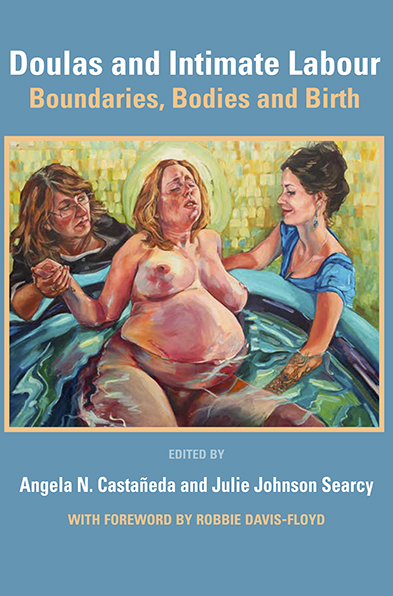
Price: $29.95
Page Count: 282
Publication Date: December 2015
ISBN: 978-1-926452-13-5
“Doulas and Intimate Labour: Boundaries, Bodies and Birth is a comprehensive compendium of scholarly contributions from a diverse group of doulas, researchers and midwives. This book provides insight, clarification, direction, and considerations, for present and future growth of the doula model of care. This model of care has been, and will continue to be, a powerful conduit for changes in childbirth, and maternity support and care. Highly recommended for required reading in nursing courses, women’s studies, doula programs, and midwifery training. An outstanding contribution to the literature!”
—Susan K. Grabia, Faculty Associate, UoW, School of Nursing, Madison, WI
This is a brilliant book which any midwife or student midwife would learn from and enjoy reading. It is ironic that it is not written for midwives but for doulas. This is partly because it comes from Canada where midwives are few but also because it addresses the intimate care which is transformative but which is steadily being squeezed out of midwifery by mounting bureaucracy and technology. It is an acknowledgement of the need for such care that the book was funded by the government of Canada.
The value of continuity of carer and the importance of relationships and “relational work” underpin all the chapters. Relationships with mothers, the community and with institutions are examined together with relationships between those working around birth. All the chapters focus on the individual mother’s journey and how she can be “empowered not overpowered”. The needs of vulnerable groups, such as relinquishing mothers and prisoners, are addressed with respect. The facilitation of transformation and grief are also are examined.
The caregiver’s own experience is explored and the development of “expertise of the self” as in dealing with our own “birth baggage”, so we are free to hold safe space for mothers. There is a perceptive chapter on ”story-centred care” and the need for “wise witnesses” and “narrative humility”. The final chapters focus on the positive potential for change within truly woman centred care, an aim which unites midwives and doulas.
—Mavis Kirkham
Acknowledgements
Foreword
Robbie Davis-Floyd
Introduction:
Across the Reproductive Divide
Angela N. Castañeda and Julie Johnson Searcy
I: DOULAS AND MOTHERS
Experts in Birth:
How Doulas Improve Outcomes for Birthing Women
and Their Babies
Megan Davidson
Retrieving the Maps to Motherhood
Alison Bastien
A Doula for the Mother and the Self:
Exploring the Intersection of Birth and Body Culture
Sarah Lewin
“Screw You Guys! I’m Not a Bad Person”:
Disrupting the Damaged Birth Mother Model
with Doula Support
Susanna C. Snyder
“When You Go through Something Like That with Somebody”:
Turning Points in the Relationships Between
Doulas and Young Mothers
Jon Korfmacher and Marisha Humphries
Doulas As Facilitators of Transformation and Grief
Amy L. Gilliland
II: DOULAS AND THEIR COMMUNITY
Learning to Walk in Water:
Invoking Yemanja on the Doula Path
Maria E. Hamilton Abegunde
“What Kind Of Doula Are You?”
Birth Doulas, Multiple Moralities, and the
Processes and Politics of “Ethical Becoming”
Nicole C. Gallicchio
“My Role Is to Walk the Tightrope”:
Doulas and Intimacy
Angela N. Castañeda and Julie Johnson Searcy
Providing Boundaries in Postpartum Doula Care
Jacqueline Kelleher
III: DOULAS AND INSTITUTIONS
Being a Doula When Birth Choice Is Limited:
Supporting Birthing Mothers in a Mexican Hospital
Vania Smith-Oka
Cultivating Collaborative Relationships in the
Provision of Labour Support:
Doulas and Labour and Delivery Nurses
Christine Morton, Marla Seacrist, Jennifer Torres,
and Nicole Heidbreder
Story-Centred Care:
Full-Spectrum Doula Work and Narrative Medicine
Annie Robinson and Lauren Mitchell
Between Two Worlds: Doula Care, Liminality,
and the Power of Mandorla Spaces
Courtney Everson and Melissa Cheyney
Reimagining the Birthing Body:
Reproductive Justice and New Directions in Doula Care
Monica Basile
Contributor Notes
Angela Castañeda is Associate Professor of Anthropology at DePauw University. Her research in Brazil, Mexico, and the U.S. explores questions on religion, ritual, expressive culture and most recently, the cultural politics of reproduction, birth and motherhood. In addition to her work as a practicing birth and postpartum doula, she also volunteers as a Spanish childbirth educator in Bloomington, Indiana, where she lives with her family.
Julie Johnson Searcy is finishing her PhD in Anthropology and Communication and Culture at Indiana University. Her dissertation research in South Africa examines the space where reproduction, disease and technology intersect as women navigate pregnancy, birth and high rates of HIV/AIDS infection. Interested in issues of gender, reproduction and
performance, she also works as a doula and childbirth educator.


